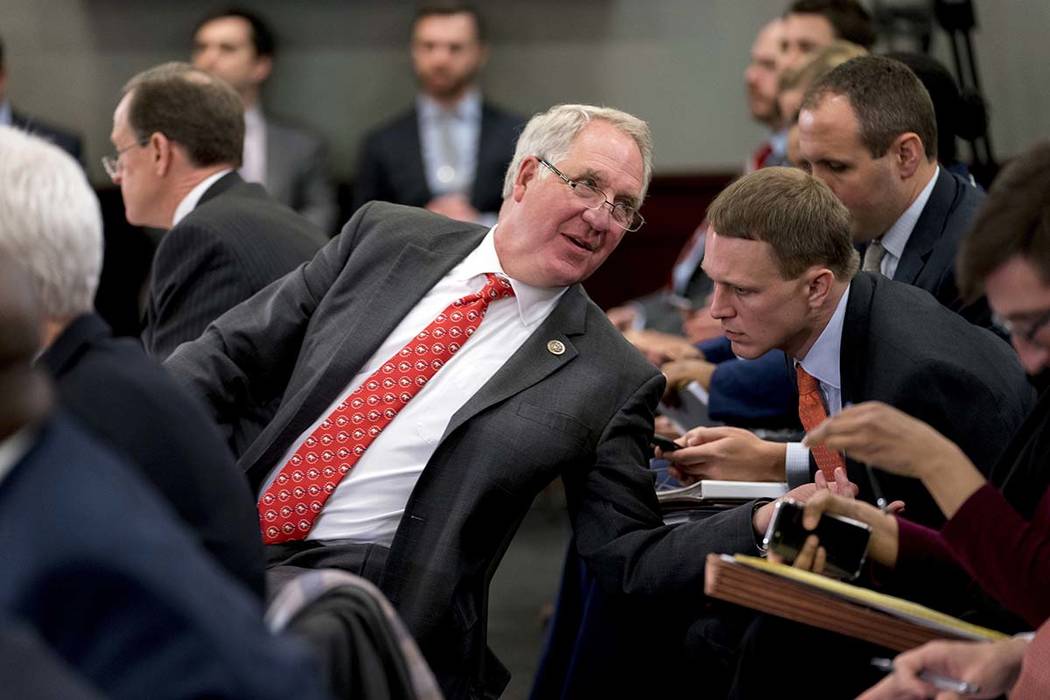Yucca Mountain advocates pursue more nuke waste funds
WASHINGTON — Yucca Mountain advocates pushed Tuesday to get a House spending panel to double a White House proposal for federal funds to jump start licensing hearings for the proposed nuclear waste storage site in Nevada over strong objections from the state.
Rep. John Shimkus, R-Ill., who wrote a bill to expand and expedite the licensing and storage of nuclear waste at Yucca Mountain, urged approval of the president’s budget request of $116 million for the Department of Energy to start licensing hearings.
Shimkus also spoke in favor of a $38 million request for the Nuclear Regulatory Commission to conduct hearings to determine whether the Nevada site is safe for storage.
He said the budget requests do not turn “one shovel of dirt.”
“Let’s get a final decision on the science, and then let’s move forward,” Shimkus said.
But Rep. Dina Titus, D-Nev., urged the same House panel not to spend another dime on the project that has been stymied for 30 years becaue of opposition in the state.
She said the federal government is forcing Nevada to store nuclear waste from privately funded power plants nationwide, against the state’s will and its concerns of risk of radiation exposure to residents and the environment.
“We don’t use nuclear energy, we don’t produce nuclear waste and we should not be forced to store it,” said Titus, whose congressional district includes Las Vegas, located just 90 miles southeast of Yucca Mountain.
She told the panel the permanent storage site is being “rammed down our throat.”
United front against Yucca
Nevada Gov. Steve Sisolak, a Democrat, state Attorney General Aaron Ford and Democrats in the state’s congressional delegation have vowed to fight federal efforts to store nuclear waste in the state.
Former Republican Gov. Brian Sandoval, tribal leaders, business groups and environmental leaders also oppose permanent nuclear waste storage.
The House Appropriations subcommittee on energy and water heard testimony from lawmakers Tuesday as the panel prepares to mark up its spending bill for fiscal 2020, which begins Oct. 1.
Shimkus passed an authorization bill in the last session with overwhelming bipartisan support from Republican and Democratic lawmakers who have nuclear power plants in their states and where radioactive waste is being stored on site, with no permanent facility developed to accept the material.
That bill died in the Senate, where lawmakers are exploring interim storage as well as a permanent solution that may include Yucca Mountain.
Another authorization bill is expected to be introduced in the coming weeks in the House, although it is uncertain whether it will mirror the Shimkus bill because Democrats now control the House.
‘Do everything’ to get Yucca moving
The chairwoman of the appropriations subcommittee, Rep. Marcy Kaptur, D-Ohio, Tuesday gave a nod toward interim storage as an initial step. “We have to take a positive step forward.”
But Rep. Fred Upton, R-Mich, who has three nuclear power plants in his state and one that has been decommissioned, urged the panel to “double” the president’s budget request on licensing of the permanent facility at Yucca Mountain. “We need to complete the licensing process.”
The ranking Republican on the subcommittee, Rep. Mike Simpson, R-Idaho, said he found proposals for interim storage “inadequate” and said Congress must move forward on Yucca Mountain.
“Politics has stopped us from solving this problem,” Simpson said.
Rep. Chuck Fleischmann, R-Tenn., a subcommittee member, told Upton that “we are going to do everything to get this funded.”
The subcommittee will need Democratic votes to approve the funding, and authorizing legislation, to allow Congress to spend the money on Yucca Mountain, where up to $19 billion has been spent since 1987 when it was designated by Congress as the site for permanent nuclear waste storage.
Sen. Lamar Alexander, R-Tenn., is working to craft a spending bill in the Senate that moves forward on interim storage immediately while the debate over Yucca Mountain continues.
The licensing process was halted in 2011 when the Obama administration withdrew funding for the process.
218-plus challenges
Experts testifying before Congress in 2017 said the licensing process would take three to five years to complete.
Nevada has 218 legal challenges to the Energy Department’s license that would need to be resolved during hearings once they resume. Another 30 to 50 challenges are expected, mostly about recent seismic concerns.
Titus told the panel that the federal government is wasting money to continue licensing, noting that it would take $1.66 billion to complete. And if found to be safe, construction of the facility would cost $96 billion.
But Shimkus told the panel that the government is paying $2 million a day for failing to take possession and dispose of nuclear waste from power plants, as is required by law.
Rep. Kay Granger, R-Texas, said the government must take control of the waste, scattered around the country, because it creates a national security threat.
By law the government must dispose of the waste at the Yucca Mountain facility, Granger said.
Contact Gary Martin at gmartin@reviewjournal.com or 202-662-7390. Follow @garymartindc on Twitter.


















